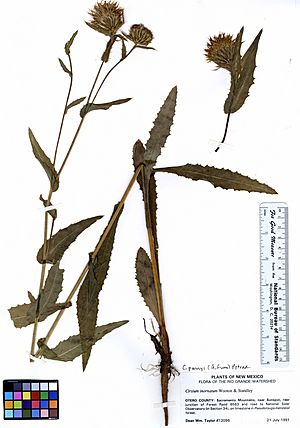Parry's thistle facts for kids
Quick facts for kids Parry's thistle |
|
|---|---|
 |
|
| herbarium specimen collected in New Mexico |
|
| Conservation status | |
| Scientific classification |
|
| Kingdom: | Plantae |
| Clade: | Tracheophytes |
| Clade: | Angiosperms |
| Clade: | Eudicots |
| Clade: | Asterids |
| Order: | Asterales |
| Family: | Asteraceae |
| Genus: | Cirsium |
| Species: |
C. parryi
|
| Binomial name | |
| Cirsium parryi (A.Gray) Petr.
|
|
| Script error: The function "autoWithCaption" does not exist. | |
| Synonyms | |
|
Synonymy
Carduus gilensis Wooton & Standl.
Carduus inornatus Wooton & Standl. Carduus pallidus Wooton & Standl. Carduus parryi (A.Gray) Greene Cirsium gilense (Wooton & Standl.) Wooton & Standl. Cirsium inornatum (Wooton & Standl.) Wooton & Standl. Cirsium pallidum (Wooton & Standl.) Wooton & Standl. Cirsium parryi (A.Gray) Cockerell ex Daniels Cirsium parryi subsp. mogollonicum Schaack & G.A. Goodwin Cnicus parryi A.Gray |
|
Script error: No such module "Check for conflicting parameters".
Parry's thistle (Cirsium parryi) is a type of flowering plant found in North America. It belongs to the aster family, which includes many well-known flowers like sunflowers and daisies. This plant grows naturally in the southwestern United States, specifically in states like Colorado, Arizona, and New Mexico.
About Parry's Thistle
What it Looks Like
Parry's thistle is a biennial herb. This means it lives for two years. In its first year, it grows leaves close to the ground. In its second year, it grows a tall stem and flowers. Its stem can be quite hairy and grow very tall, sometimes over 200 centimeters (80 inches).
The leaves of Parry's thistle are shaped like long ovals or spears. They can be 10 to 30 centimeters (4 to 12 inches) long. Often, their edges are toothed or partly divided into sections called lobes. By the time the plant flowers, the lower leaves usually dry up and fall off.
Its Flowers
The plant's flowers grow in groups called inflorescences. These groups can have many individual flower heads. You'll find them at the top of the stem and near the upper leaves. Each flower head is about 2.5 centimeters (1 inch) wide.
At the base of each flower head are spiny leaf-like parts called bracts. The phyllaries are green with brownish tips and line the sides of the flower head. Inside the head, there are many small flowers. These are usually yellowish, but sometimes they can be purplish or white. Unlike some other plants in the aster family, Parry's thistle does not have large, petal-like ray florets.
After the flowers bloom, they produce fruit. The fruit is a type of seed called an achene. It can be over 2 centimeters (0.8 inches) long. Each achene has a fluffy top called a pappus, which helps the seeds float away in the wind.
Where it Grows
Parry's thistle likes to grow in damp places. You can often find it in coniferous forests, which are forests with cone-bearing trees like pines and firs. It also grows in meadows and close to streams where the soil stays moist.
Interesting Facts
Sometimes, Parry's thistle can mix its genes with other thistle species. This creates what are called hybrids. For example, it can form hybrids with C. grahamii in Arizona. It can also hybridize with C. canescens in Colorado.
 | Isaac Myers |
 | D. Hamilton Jackson |
 | A. Philip Randolph |


